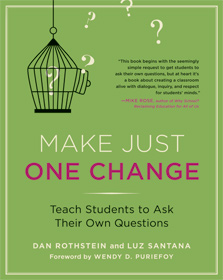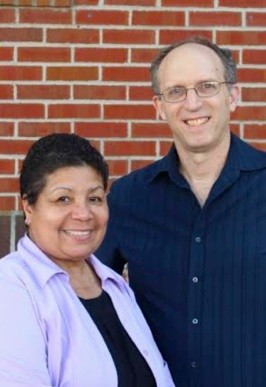Lessons from a Harvard Medical School Conference on Medical Education
Dan Rothstein | Co-Director, The Right Question Institute.
I recently crossed the river from Cambridge to Boston to spend some time at Harvard Medical School listening to a slew of fascinating discussions about how to improve medical education. Harvard Medical School (HMS) deserves a lot of credit for thinking very seriously about what its graduates should know and be able to do. There’s no apparent external pressure forcing HMS to rethink medical education. The school is not scrounging for applicants. It’s not lacking in prestige. There’s no billion dollar donor pushing for a change in its curriculum. There seems to be a simple, genuine and humble recognition of the need, in an age of information overload, to reflect upon and rethink medical education. That willingness to reflect, conference speakers made clear, is actually a thinking habit it wants to inculcate in its students.

Implicit in this rethinking is also a recognition that doctors cannot possibly know everything. In this age of instant access to more information than we could possibly absorb that might seems to be obvious. But, admitting to ‘not knowing’ something can be difficult in a field in which existing information and knowledge is supposed to reign supreme. If a slight presumption of omniscience is relinquished, what should take its place?
The conference organizers, Dr. Barbara Cockrill, Dr. Christopher Smith and Dr. Richard Schwartzstein, put together a coherent set of sessions linked to challenges, methods and opportunities for improving assessment in medical education. In the sessions I attended, I heard the message over and over that medical students need more than information, they need to learn to think well. Information will, of course, still be important, but any knowledge, informed even by a vast amount of information, must be used to shape good thinking. And, good thinking is a complex task.
How do you promote good, reflective thinking in medical education?
The keynote speaker, Dr. Ronald Epstein of the University of Rochester School of Medicine, focused on assessment as both a means to gauging what students know and as a tool to help them learn more. In trying to delineate what a graduate of a medical school needs to know, Epstein referred to Hubert Dreyfus’ scale which describes an “expert” as one who “revels in knowing the answers” while a “master revels in knowing the questions.” (Dreyfus & Dreyfus, 1980)
How is it possible to get students, as well as participants in graduate medical education (GME) to know the questions that should be asked and to know how to generate their own questions? This is no small task. So much of education in general, not only medical education, has been based on a model in which the “wiser” and more “knowledgeable” person ask questions of the “less wise.” Think of Socrates and all who have followed in his footsteps.
Should we rely on “Masters” to show us the way? The “Master” level that Epstein referred to is often achieved only through years of professional training and, he asserted, is “particularly important…because the kind of clinician I would want to go to as a patient is someone who is asking the right question.”
He gave specific examples of the kind of reflective questioning he would like all doctors to use. He sometimes asks his students “what are you assuming about this patient that might not be true? That is a question that stops people in their tracks. It gets people to reflect.”
Clearly, Epstein, as the Socrates in the room, knows how to ask just the right question to get his students to think more deeply. He then made, it seems to me, a big intellectual leap when he followed with: “If you start to ask those kinds of questions enough, students will begin to assimilate those questions.” That is an assumption worth checking. He bases it on his own experience: “…my best teachers have been the ones who have taught me to question myself in that way.”
Who can guarantee that the average medical student will be coached or guided by one of the “best teachers?” How likely is it, in a diffused teaching environment with scores of adjunct faculty, that all students will learn to ask good questions? Are all students also expected to match Epstein’s readiness and openness to learning from the modeling behavior of his instructors? What percentage of current medical educators are modeling asking good, reflective questions? And, what percentage of their medical students will pick up on it as Epstein did, if modeling is the only method deployed?
Could medical students, all medical students, actually learn how to ask better questions? Yes, but it will require a change for students as well as their instructors.
Dr. Schwartzstein asked such a question of Epstein towards the end of the session: “Is it actually possible to teach everyone to be reflective?” Epstein acknowledged the challenge, and said that the challenge of creating the good, reflective questioner is actually worthy of another lecture entirely. A “rigid personality” he noted, may not want to ask reflective questions or be asked such questions by others. Unfortunately, he noted such “maladaptive personality traits are reinforced in the first two years of medical school because there are right answers” and then, when “people who do really well in the classroom…hit the wards, we get messages” that they are clearly not well suited to providing medical care.
Epstein’s belief that students will learn how to ask questions from the best teachers leaves too much to chance and serendipity. I doubt that there is any evidence that the proper modeling of “reflective questions” or “good questioning” by the “best teachers” has actually succeeded in preparing, if not all, then at least the majority of medical students to ask better questions. Some research, indeed, suggests the opposite. In his book, How Doctors Think, Dr. Jerome Groopman (2007) cites research about how doctors’ “cognitive traps” can lead directly to misdiagnoses. A question, a good one from a colleague or assistant, or even a basic and simple one from a patient, Groopman argues, can provide liberation from these traps (Epstein actually offered an excellent example of a useful self-reflective question: “What am I assuming that might be wrong?”)

Could medical students, all medical students, actually learn how to ask better questions? Yes, but it will require a change for students as well as their instructors. The students occupy those coveted medical school seats primarily because they’ve been very good at giving answers for a long time. And, that ‘answer-on-demand’ performance actually continues. In the opening session, Schwartzstein noted that in students’ first “two years of medical school, answers, not questions, are rewarded.”
Teaching the skill of question formulation is a way to democratize access to a very sophisticated thinking skill that all medical students need to learn.
Could Questions Occupy a More Prominent Place in Medical Education?
It may not be on the radar of medical school faculty, given all the information they need to convey, to actually think much about how to develop that “Master-level” ability to ask good questions. But, if that ability is as important as Epstein and others argue, then “modeling” cannot be the primary method for promoting the skill.
Making just a few small changes might greatly increase the percentage of medical students who learn how to ask better questions. Here are six ideas to consider; three are related to recognizing the importance of questions and three are focused on deliberately teaching the skill of question formulation.
Recognize the Importance of Questions
- Make Explicit the Importance of Questions When Thinking about the Unknown: In his book Ignorance: How it Drives Science, Stuart Firestein (2012), the Chair of the Biology Department at Columbia University asserts that for students to “decipher a complex world,” educators “must teach students how to think in questions, how to manage ignorance.” In the spirit of Firestein’s ideas, perhaps it would be helpful if seminars, discussions, and lectures would not only feature the presentation of what is known, but also feature key questions a field needs to address. Thinking about new questions would reinforce a message to students that even the experts in the field recognize the need to continually work on the next question.
- Make Explicit the Connection Between Questions and Critical Thinking: Dr. Schwartzstein and Dr. Edward Krupat, Director of Evaluation for Harvard Medical School led an engaging workshop exploring ways to promote medical students’ critical thinking abilities. The central importance of questions, for analyzing, reviewing, and synthesizing information as well as in diagnosing and decision-making should be made explicit. Critical thinking depends, at its core, on the ability to ask good questions.
- Collect Student Questions Over Time. Dr. Susan Frankl led an active learning workshop on creating portfolios of students work over the course of their medical education. As students’ knowledge increases, they can better reflect on the greater sophistication of their questions over time if they have a record of them. The questions will also remind them of a scaffolding process that led from simpler to more complex questions and sometimes back to fundamentally important simple questions again.
Deliberately Teach the Skill of Question Formulation
- Encourage Specific Questions Before Action: Students, before assuming anything when looking at the familiar or struggling with the unknown, should learn, at a minimum, to think about a set of three questions put together by Warren Berger (2014), an expert on innovation, in his book, A More Beautiful Question: Why? What if? How?
- Create a Short, Discrete Module to Teach the Skill of Question Formulation. It could be inserted at any point during the first two years of medical education. For more than a decade, we have been testing, in a wide range of fields and environments, the use of a simple, but rigorous process – the Question Formulation Technique (QFT) – that allows all learners, from novices to experts, to learn how to better a. produce their own questions, b. improve their questions and c. strategize on how to use them. Our book, Make Just One Change: Teach Students to Ask Their Own Questions focuses on K-12 education but the same process has been easily adopted for higher education and can be easily adopted for use with medical students (Rothstein & Santana, 2011).
- Integrate the Use of the Question Formulation Technique into Regular Coursework. Professor Dan Perlman, the Associate Provost for Innovation in Education at Brandeis University, for example, has integrated the Question Formulation Technique into his regular pedagogical practice. His biology students learn the skill of question formulation at the beginning of their course. They set a learning agenda that they then discover is addressed throughout the course. They further develop their skill of asking better questions during the semester and at the end of the course, the repeat the exercise from the beginning of the course and see how their new questions are informed by all they have learned.
A Small, but Significant Shift in Practice
The modeling of a few professors asking good questions will not suffice for helping more medical students learn to ask better questions. To make it possible for all medical students to learn to ask better questions, there is a need for a small, but significant shift in practice. The shift is simple: It is necessary to deliberately teach the skill.
If the leadership of an educational institution makes that shift and recognizes the need to foster students’ ability to ask better questions, then they will need to begin a process so individual educators will become comfortable and adept at implementing the change. Change is always difficult, but this one can be done relatively easily once professors, instructors and adjunct faculty understand they need to relinquish for only a brief moment in the entire span of medical education the power of being the only one in the room who asks the questions.
Dr. Ron Epstein made a compelling case for “reflective thinking” in his keynote address. His talk helped me reflect further on the importance of questions in medical education, on what faculty could learn from questions students ask, and what students could learn by developing their ability to ask better questions and to reflect on them. Teaching the skill of question formulation is a way to democratize access to a very sophisticated thinking skill that all medical students need to learn. The students will become better thinkers and practitioners. Medicine will benefit and so will patients.
It can be done. Who will make it happen?
—
University of California and the Air Force Office of Scientific Research. (1980). A Five Stage Model of the Mental Activities Involved in Directed Skill Acquisition. Washington, DC: Dreyfus, S.E., Dreyfus, H.L.
Groopman, J. (2007). How Doctors Think. New York: Houghton Mifflin Company. Pg. 24.
Firestein, S. (2012). Ignorance: How it Drives Science. New York: Oxford University Press. Pg. 176.
Berger, W. (2014). A More Beautiful Question. New York: Bloomsbury USA.
Rothstein, D., Santana, L. (2011) Make Just One Change: Teach Students to Ask Their Own Questions. Cambridge: Harvard Education Press.




I always stress to my students as they get to the clinical years to always have the “The WHY FACTOR” in everything they see, hear, smell, touch and so on.